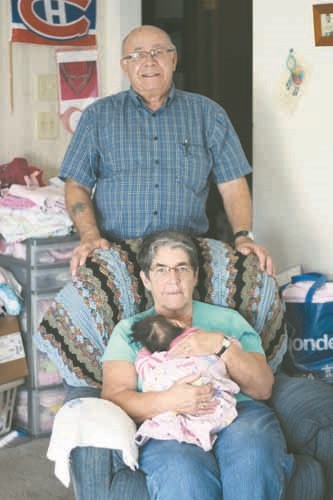After 45 years of taking in foster children, Yorkton couple Ken and Vanessa Buchan were an obvious choice for the Helen Montgomery Award.
The provincial award, given to the Buchans at a ceremony here on October 28, goes each year to a Saskatchewan family that has "demonstrated outstanding commitment to fostering" and to the community.
But that's not why the Buchans have given a home to more than 150 children since 1965."They do more for us, I think, than we do for them," says Vanessa as she rocks the latest infant in her care to sleep.
This one requires regular tube feeding. It's nothing out of the ordinary for Vanessa, who has taken extensive medical training over the years to keep up with the needs of her foster children."We do the best we can for them. They give us their unconditional love."
At the moment, the Buchans are caring for four kids ranging from a few months old up to senior high school students. They moved to Yorkton -Ken's hometown - nine years ago mostly for the medical, social, and educational opportunities the city would provide their kids.
Almost all of the children the couple has taken in have been infants, and most of them have had high medical needs. Vanessa is one of very few foster parents in the region with the training needed to handle these cases.
"It's not something I set out to do - it just happened. But it's a challenge, and it's a good challenge, and I enjoy that."
Before coming to Yorkton in 2001, the Buchans lived all across the country, fostering children in Ontario, Quebec, Manitoba, and Saskatchewan. Ken's calling as an Anglican priest kept them on the move. Their last home was in the village of Punnichy, from which Ken ministered the Kawakatoose, Day Star, and Gordon First Nations for 13 years.
That history on the reserves gives the Buchans a special connection to the culture of the primarily aboriginal children they take in.
"It was a culture shock coming here after 13 years working on reserve," says Ken. "For a while, I was still on the reserve in my mind. I probably still am, I guess."
Over their 51-year marriage, the couple has raised two birth children along with seven more kids brought in on a permanent basis - either through formal adoptions or long-term foster placements - but they don't like to differentiate.
"I've always said that if I see that in our obituary, I'll come back and haunt them," jokes Vanessa. "They're all our children, and they're all God's children."
But the nature of foster care means that most placements are much less stable.
"We had one little girl who left two years ago. She was two and a half years old, and we'd had her since she was a baby," Ken recalls. "That was tough."
The process is made harder by the Buchans' knowledge that sometimes it is best not to stay in touch with the children who leave their home.
"We can, but it makes it harder on everyone," says Vanessa. "Once you've let go, you have to let go."
The couple always keeps in mind that the system's ultimate goal is to return the children to their families. By that measure, they have been involved in countless successes over the years.
And while they are often left wondering what became of their former charges, in many other cases the Buchans have been able to keep in touch. Birth parents often seek out their advice and support.
After 45 years, they have watched many former foster children grow into happy adults with kids of their own.
"That's really rewarding," says Vanessa.
Still, says Ken, fostering is not something for everyone.
"There's all kinds of support out there, but you need to have the will to do it.""It's got to come from the heart," adds Vanessa.
The Buchans cite their strong Christian faith as a major part of what keeps them going.
"If you didn't have a faith, I don't know how you'd survive. ... You have to have someone to talk to," Vanessa says.
The Buchans now actively work with supporting and training other foster parents. Vanessa is a co-facilitator with the PRIDE (Parent Resources for Implementation, Development, and Education) program, teaching prospective foster and adoptive parents some of what she knows. Many parents give up or don't make the cut, but those who pull through have a good foundation to face the challenges ahead of them.
"It's kind of interesting to see - I think, 'Gee, was I really that green once?'" Vanessa laughs.The Buchans are constantly learning, as well, and that's part of why they keep at it.
"If ever we come to a point where we say, 'We've arrived - we've learned everything,' it's time to quit," says Ken.
An open, accepting mind is essential to the fostering lifestyle.
"Our job is not to put down the parents of these children. Some of them have come from pretty horrific situations themselves," Ken says. "We try to instill that into our children - that their birth parents are good people. They've just fallen by the wayside. It could happen to us, too."




